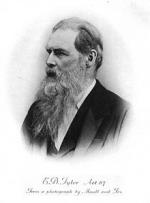Disable ads!
Edward Burnett Tylor
Anthropology Disciplines Archaeological Biological Cultural Linguistic Social Discipline subfields Social and cultural subfields Applied Art Cognitive Cyborg Development Digital Ecological Environmental Economic Political economy Feminist Historical Kinship Legal Media Medical Musical Nutritional Political Psychological Public Religion Transpersonal Urban Visual Linguistic subfields Descriptive Ethno- Historical Semiotic Sociolinguistics Archaeological and biological subfields Anthrozoological Biocultural Evolutionary Feminist Forensic Maritime Palaeoanthropological Research framework Ethnocentrism Ethnography Ethnology Emic and etic Participant observation Online ethnography Cross-cultural comparison Holism Reflexivity Cultural relativism History of anthropology Key theories Actor-network theory Alliance theory Cross-cultural studies Cultural ecology Cultural materialism Culture theory Diffusionism Feminism Functionalism Historical particularism Interpretive Performance studies Political economy Practice theory Structuralism Post-structuralism Systems theory Key concepts Evolution Society Culture Prehistory Sociocultural evolution Kinship and descent Gender Race Ethnicity Development Colonialism Postcolonialism Value Lists Outline Bibliography Journals By years List of indigenous peoples Organizations Anthropologists by nationality Anthropology portal v t e Sir Edward Burnett Tylor (2 October 1832 – 2 January 1917), was an English anthropologist. Tylor is representative of cultural evolutionism. In his works Primitive Culture and Anthropology, he defined the context of the scientific study of anthropology, based on the evolutionary theories of Charles Lyell. He believed that there was a functional basis for the development of society and religion, which he determined was universal. Tylor is considered by many to be a founding figure of the science of social anthropology, and his scholarly works helped to build the discipline of anthropology in the nineteenth century. He believed that "research into the history and prehistory of man... could be used as a basis for the reform of British society." Tylor reintroduced the term animism (faith in the individual soul or anima of all things, and natural manifestations) into common use. He considered animism to be the first phase of development of religions.
 Read more on wikipedia.org Read more on wikipedia.org
 All quotes by Edward Burnett Tylor All quotes by Edward Burnett Tylor
 Edit Edit
|

|
|
|
|
|
Background photo by Giuliana
|